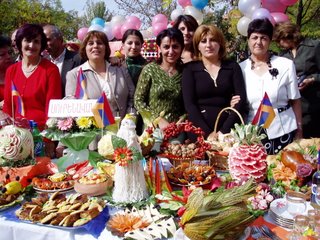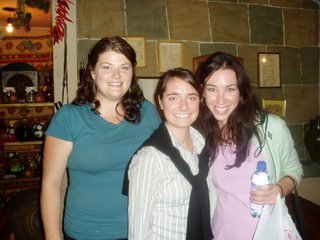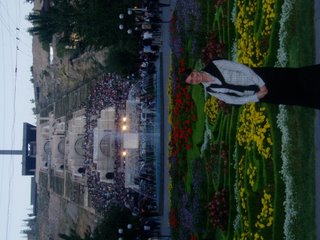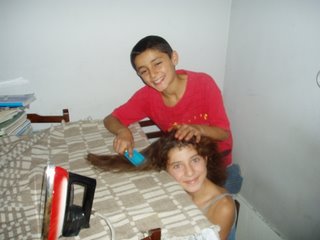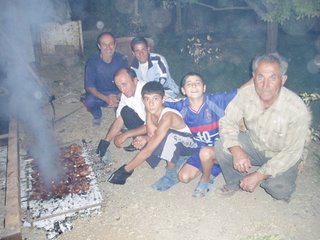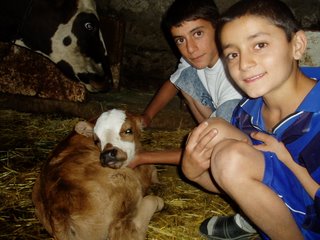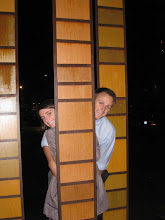"The issue isn't wether you're liked or appreciated or whether your credentials are adequate or whether your intentions are good; it's simply a matter of trust and credibility, which can only come over time. It's not that they're not glad to see you, they're just trying to figure out who and what it is we've got here." I read this quote from
A Few Minor Adjustments and thought it was perfect for the next step in Peace Corps process. We're wrapping up the last days here and preparing for our new lives in our permanent sites which brings another wave of ambiguity and questions of acceptance from the Armenian people. This time, however, we don't have the security of Language and Cultural Facilitators or PC staff to help us work through problems. It's simply up to us to get the job done.
My mom sent me a few questions that she said everyone is interested in knowing. I'll try and tell you some things I must be leaving out in my communications. First, let me say a very heartfelt thank you to everyone who has sent me mail during training. Receiving letters and packages is by far the highlight of my visits to the city. Thank you for your thoughtfulness!
My diet:
Every morning I wake up and eat one egg, which is hardboiled. This is not optional but I sometimes get creative with how I eat it in an effort to amuse myself. My newest creation is cut up egg with tomatoes. Sometimes I put it on bread but I've gotten spoiled and now I'll only eat the bread when my mom has baked it fresh that day or the day before. Two days ago my mom tested a new dish at dinner: Matsoon with raspberry muraba. Matsoon is a staple in Armenia, it is a very bitter yogurt substance that they put on just about everything (just like we do in America with Ranch dressing). I refused to touch it because I think it tastes like goat but then my mom realized what a sweet tooth I have and she added the raspberry muraba (a soupy raspberry jam). It makes for some delicious raspberry yogurt! Now I get to eat this in the morning with my egg. She also makes hot coco for me because I don't really enjoy coffee and sometimes we'll have some pastries. For lunch if it is a central day (the days we're in the city) I eat bread with tomatoes and cheese. The cheese here is nothing like Kraft (although I hear you can buy Kraft mac and cheese in Yerevan). It's called 'salty cheese' and salty it is. My host mother found some unsalty cheese but it's got the consistency of string cheese and it's pretty tough. I eat it though and don't mind at all. For dinner sometimes we'll have a BBQ (horovats) or we'll eat a greenbeans and eggs dish. The most popular dinner in Armenia is Tolma which is a cabbage wrap with ground beef and rice on the inside. Sometimes we have macaroni. Every meal comes with fried potatoes. It's a staple from the garden in the back of our house (and very common for all the households in this region). Some meals I've eaten have consisted of all carbs: potatoes, bread, macaroni and a cream-filled donut. Good thing I'm not on Adkins!. She learned that I love carrots and so she makes "carrot salad" which means she shreds the carrots and pours sugar on top. It's good. Everything we eat my host mother manages to make unhealthy. I've managed to break her of the great salt consumption but I can't seem to shake the amount of fat from a tin and vegetable oil she uses. A part of me thinks the oil is to combat a sticky pan on the stove but I know for sure that she just likes the immense amount of grease. Every family is different though, and I think my host family in my new site eats a little more reasonably. I guess we'll see. The girls I run with were very interested in how much I weigh and when I told them that I didn't know they took me to their Tatik's house and put me on the grain scale. It was in kilograms but they were pleased. I told them as long as my pants fit I'm not worried about how many kilos I weigh. One last thing about food, yesterday at the central day our medical session was about food shopping in country and food preparation. They taught us about safety issues like botulism but they also gave everyone a cookbook and had cooking demonstrations! I was very very excited about this session (as you can imagine). We learned how to make Mexican dishes, Italian, Asian, and even chocolate chip cookies! It was one grand potluck at the end and we enjoyed some very delicious (familiar) tastes.
Speaking of Central Days and my PC training, I might share some of the topics we've covered in preparation for service. Someone once said: "PST is like trying to take a sip of water out of an open fire hydrant (there's an explosion of information/culture and emotions)...try to take those sips." Although every sector is different, community health volunteers have covered many interesting topics during the past two months. We've had speakers come in to discuss NGO operation and social services provided to Armenians. We visited a sanitorium for TB patients or children who have parents with TB. We have learned about the basic health package for specific groups of the population and today, for instance, we visited a city hospital. There are some sessions that every trainee attends that cover broad cultural or technical information. We've studied the Armenian genocide and history in these sessions and welcomed influencial leaders to speak (such as the American Ambassador or the head of USAID). We've studied corruption and it's impacts in our work. The most important sessions for me are about how we can use commitment, resources and skills to build capacity in the country. We're trying to help people help themselves and so proper analysis of the communities needs is very important. One example that was described to us occured in a school where an international organization donated money to renovate and replace the restrooms. They bought all new toilets, doors and sinks and within three months the entire facility had been taken apart. The doors were stolen, the toilets broken and the sinks missing things like handles. When asked why the children were so 'disrespectful' of the gift, they replied that they didn't need a new restroom. It wasn't their hope to have new toilets, they didn't care if they had to use a hole outside. Then, someone decided to ask the students what they would do if they had been given the money. The stuents participated in participatory analysis for community action (PACA) and what the people discovered was that what the kids really wanted was new curtains for their classrooms. Of course if you asked me, the American volunteer accustomed to running water and European toilets, what I would like, I would reply a new restroom. For these kids, however, having a nicer classroom was a higher priority. So this is where we're learning about evaluation. We're also studying the ADDIE model for cirriculum design and lesson plan development. We're learning about organizations that we can collaborate with in our communities (for instance my village has a youth action committee). We're studying grant writing and how to apply for money for the projects our community would like to initiate.
The Peace Corps gave us our new job descriptions: We are learners, change agents, co-trainer and co-facilitators, project co-planners and mentors. Nothing we do should be our personal priority, it should instead be what our community would like to see happen. I think that the people of Armenia are creative, they do have a desire to change and work and grow, but sometimes there just isn't an outlet. My job is to provide that outlet in my village.
I am all out of time for now but I will write to you about international relations, the genocide and earthquake and anything else you would like to know. It may take me some time as we're quite busy preparing for swearing in on the 14th and moving to our new village on the 15th. Also, school starts (first bell) on September 1, but I promise I have not forgotten you and will continue to do my best to share anything you would like.
Much love!
